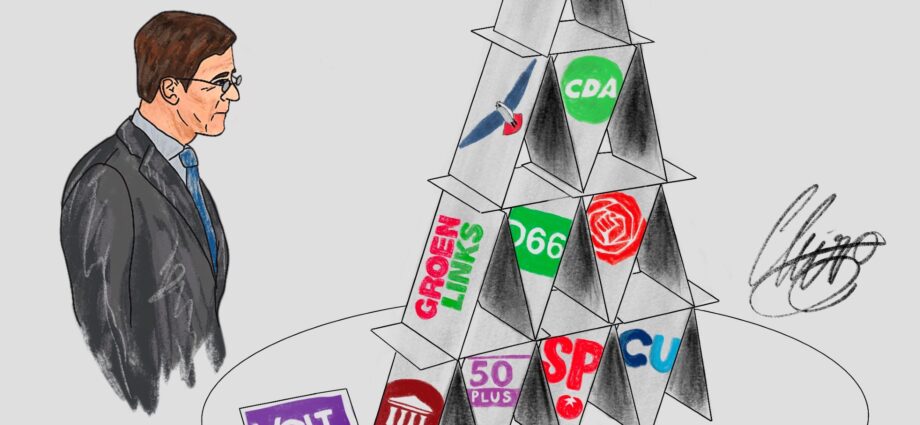By Helena Reinders
“In about a year, on the 17th of March, the Netherlands will have its next general election. This is, of course, if the current government does not fall prematurely.” (Schulte, 2020).
The above mentioned quote comes from a Shpaera article written by Tom Schulte almost a year ago now. In it, he explains the COVID-19 crisis to be the ultimate test for Dutch prime-minister Rutte and his cabinet (Rutte III). Little could he have known that the cabinet would eventually fall, on January 15th 2021, a mere two months prior to the national elections. However, whereas the previous Sphaera article talked about the COVID-19 crisis being the deciding factor for the success or failure of Rutte III, it ended up being a scandal surrounding child-care allowance which broke the camel’s back.
The scandal dates back all the way to 2004, when a new law allowed for both working single parents and working couples to request money from the government to send their children to daycare while they work. This money was conveniently named child-care allowance (kinderopvangtoeslag). This allowance program was run by the Ministry of Social Affairs and Employment, but was handled and implemented by the Dutch Tax and Customs Administration (Belastingdienst, part of the Ministry of Finance).
In and of itself, the law may be seen as a positive, since it helps working parents to both maintain their job and provide care for their children. The problem at hand, however, is that many parents were unrighteously classified as fraudulent, accused of taking advantage of the child-care allowance without being entitled to it. Most of these parents were found to have ‘foreign sounding names’ or to have a dual nationality. Although the first of these cases already got picked up by news media outlets in 2009, it took until 2017 for CDA politician Pieter Omtzigt to speak up about the issue in parliament, and until 2019 for SP politician Renske Leijten to hold the cabinet accountable for the case, which by then already consisted of 280 combined cases.
Throughout 2020 there were two main focuses within Dutch parliament: COVID-19 and the child-care allowance affairs. As Rutte III struggled to maintain support for anti-COVID measures taken by the government, it was also facing harsh criticism for its response towards the child-care allowance affairs. As many of its ministers were also present throughout the various cabinets responsible for the child-care allowance over the past years, Rutte III has no way of blaming previous cabinets. Instead, the blame was put on the Tax and Customs Administration, which in turn blamed the previous and current cabinets for passing a law aimed at tackling tax-fraud by immigrant workers in The Netherlands.
After months of harsh debates regarding the topic the opposition requested a Parliamentary Interrogation Committee, the most severe instrument parliament is able to utilize to keep the government in check. This committee interrogated multiple actors in the affair, including VVD Politician and at that time Prime Minister Mark Rutte, both the former and current ministers of Finances, ministers of Social Affairs and Employment, as well as (previous) heads of the Tax and Customs Administration.
Its report, published December 17th 2020, was titled “Unprecedented injustice”. The report mentions how through such injustice the fundamental principles of the rule of law were violated. Roughly a month after its publication, the cabinet decided to hand in its resignation.
This led us to the current situation, in which we have a demissionary cabinet consisting of the old cabinet acting as a caretaker government until the elections on March 17th. The real questions everyone has now, though, is how (if at all) this scandal will impact the 2021 national elections.
The demissionary cabinet consists of the VVD (conservative liberalism and the current biggest party in parliament), CDA (christian democrats), D66 (progressive liberalism), and CU (christian democrats). Out of these parties, you would expect for the VVD to be most associated by voters with the child-care allowance scandal as prime-minister Rutte is their party leader. This, however, does not seem to be the case. Dutch research institute I&O concluded on January 27th 2021 that the current polls show little to no change in the voters’ views on any of these parties.
Where change is found, however, is in the opposition. The PvdA (labour party) has seen a rise in appreciation. After their party leader Asscher, who was also the minister of Social Affairs and Employment during the years 2012-2017, resigned fully from parliament Lillianne Ploumen took over. In the polls this seems to have led to a growth in appreciation for the party as a whole, as many voters (both left and right wing) support Asscher’s decision to resign.
How is it possible, though, that such a big affair seems to have had little to no impact on polls? The answer is simple: many voters do not suddenly switch from right to left wing parties. Although some voters might be prompted to switch parties, this oftentimes happens between like-minded parties. The current (demissionary) cabinet consists of mostly right-middle parties, meaning their voters are not likely to make a full switch to voting for one of the opposition parties.
So what will happen during the coming elections? Unless the polls are completely off, probably nothing much different from what has happened over the past decade. Mark Rutte has been prime minister of The Netherlands for over a decade now and odds are he might just add another 4 years to that resume. The real question is if the VVD will choose to form another cabinet with the same parties or if they will try their chances with different political parties.
Edited by Gunvir Paintal, artwork by Chira Tudoran

